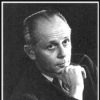Hans Selye

Hans Selye
János Hugo Bruno "Hans" Selye, CC, was a pioneering Austrian-Canadian endocrinologist of Hungarian origin. He conducted much important scientific work on the hypothetical non-specific response of an organism to stressors. Although he did not recognize all of the many aspects of glucocorticoids, Selye was aware of their role in the stress response. Charlotte Gerson considers him the first to demonstrate the existence of biological stress...
NationalityCanadian
ProfessionScientist
Date of Birth26 January 1907
CountryCanada